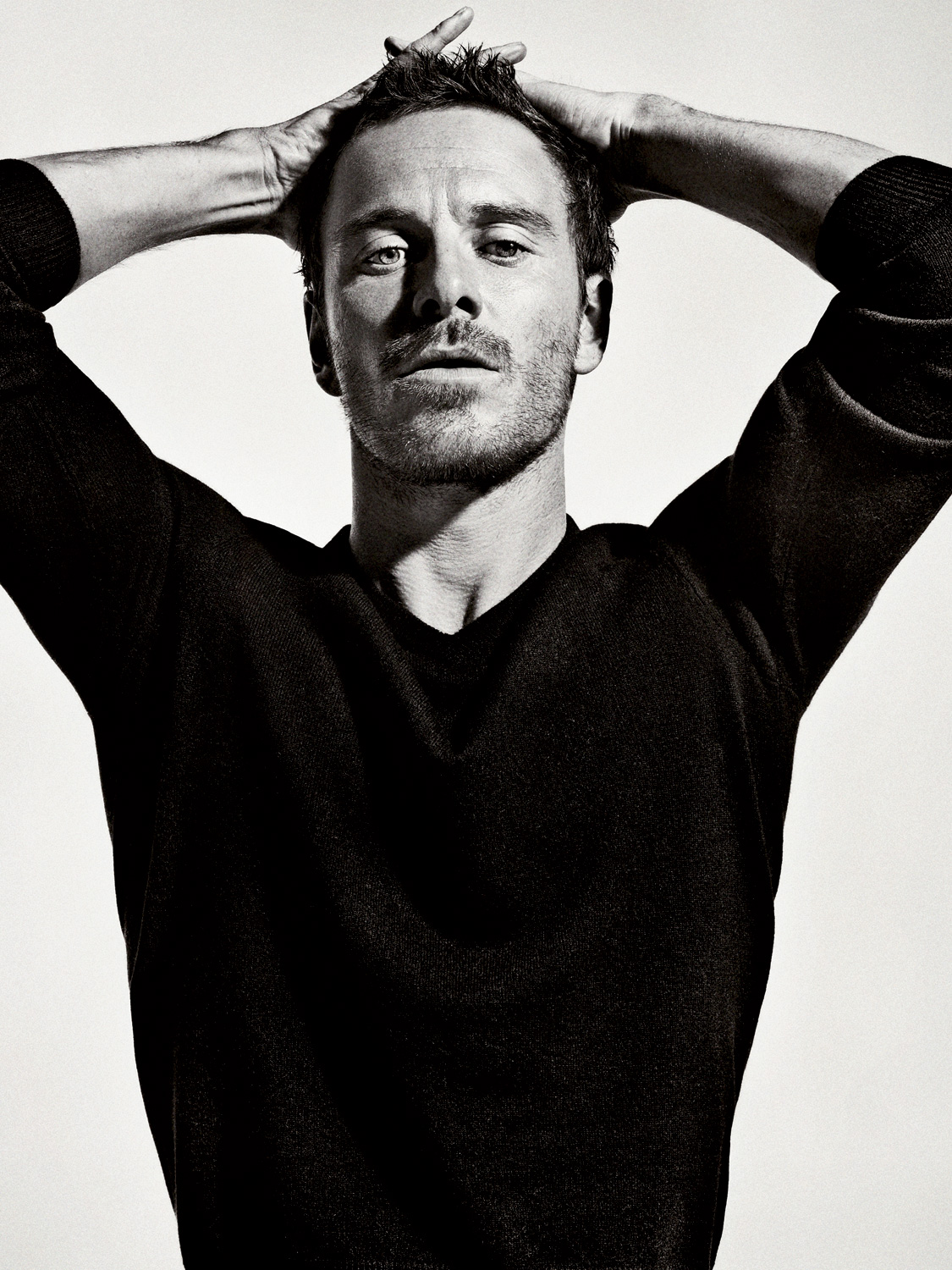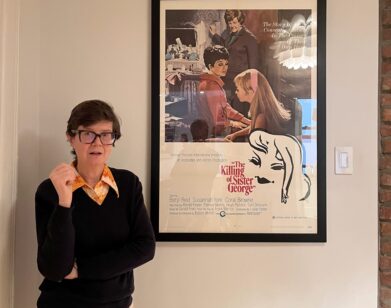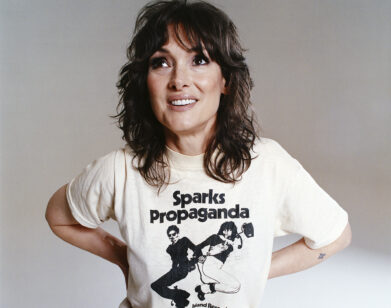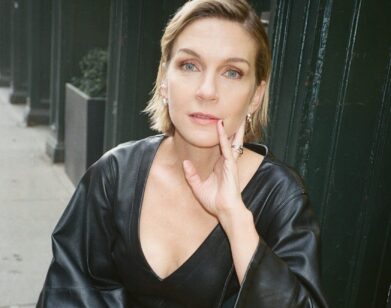Michael Fassbender
I like characters that are flawed because we all are . . . People are complicated. Our behavior towards one another is strange. So I like opportunities to investigate that.Michael Fassbender
Anyone who has seen Michael Fassbender’s performance in Steve McQueen’s new film Shame has likely walked away with two images permanently burned into his or her brain. One arrives early in the film as Fassbender’s character, Brandon, a moneyed Manhattanite with a raging sex addiction whose life is upended when his equally damaged sister (Carey Mulligan) moves in with him, awakes naked in his stark white apartment and begins to amble toward the camera. His full manhood is on display in the bright morning light—the first of numerous artfully orchestrated shots of Fassbender’s package that spring up throughout the film (and that helped earn it an NC-17 rating). The second image comes later, as Brandon, after a long night drifting and hunting and a little unexpected foreplay in the back room of a gay club, finds himself knotted in an intense threesome with two women, his face twisted in a mix of animalistic delirium and sheer hopelessness. The first image, with its nudity, is the one that became the central talking point amongst both critics and audiences when the film premiered at the Venice Film Festival this past September—another predictable, if unconventional, case of a leading man seemingly upstaged by his scene-stealing co-star. But it’s what the dark, complicated ferocity of the second image represents—a potent snapshot of Fassbender’s tragically human rendering of Shame’s lost-soul protagonist throughout the entire film—that helped earn the 34-year-old German-born actor top honors at both Venice and the British Independent Film Awards as well as a Golden Globe nomination. But perhaps more significantly, Fassbender’s work in Shame has helped radically expand his growing reputation as one of the film world’s new, idiosyncratic shape-shifters.
Fassbender’s ascent, though, has been far from swift. He grew up in Ireland, and moved to London at 19 to enroll in drama school. In the years following, he managed to score a small part in the 2001 HBO mini-series Band of Brothers, as well as some British TV work and a role in Zack Snyder’s Spartan fantasy film, 300 (2007). But it wasn’t until he was cast in McQueen’s directorial debut, Hunger (2008), as Bobby Sands, the imprisoned IRA activist whose death in 1981 following a 66-day hunger strike sparked riots in nationalist quarters of Northern Ireland, that things began to take off. To play Sands, the six-foot Fassbender dropped down to a paltry 125 pounds, surviving for a time on a diet of only 600 calories a day, and for his efforts, was awarded his first best-actor BIFA. The following year, he portrayed a wry British spy who gets whacked in Quentin Tarantino’s Inglourious Basterds (2009), and since then has worked virtually nonstop, inhabiting a succession of roles that have given him ample space to showcase his ability to slip his skin. In fact, the release of Shame in December capped a banner year for Fassbender in which he played a slippery 19th-century English master (the elusive Mr. Rochester in Jane Eyre), a megalomaniac comic-book mutant (Magneto in X-Men: First Class), and one of the fathers of psychoanalysis (Carl Jung in David Cronenberg’s A Dangerous Method). He is one of those actors who, through the subtlest adjustments in their physical appearance or demeanor, can appear younger, older, meeker, or more intimidating. And while Fassbender’s ability to morph, change, and disappear into characters may have been at least in part responsible for the early slow-burn of his career, it’s now one of the driving forces behind his newfound success.
“What’s most compelling about Michael is his femininity,” says McQueen, who is set to reteam with Fassbender for a third time later this year for 12 Years a Slave, unwittingly echoing Fassbender’s own assessment of him (see interview below). “Michael is a very masculine person. One could say he’s a man’s man. But what elevates him for me—and I think what draws audiences to him—is his understanding that when you play the character, that person is somehow related to the audience. A lot of movie stars are not human—they’re more than human in a way, so there’s a barrier that exists between them and the audience. But Michael has a fragility that allows him to have a relationship with an audience that has no barrier.”
“You can forgive Michael anything,” says Keira Knightley, who costarred with Fassbender in A Dangerous Method. “It doesn’t matter what kind of character he plays. He can always put an audience on his side, which makes his work fascinating because it continually makes you, the viewer, question the situation.”
This month, Fassbender stars alongside mixed martial arts star Gina Carano, Channing Tatum, Ewan McGregor, Antonio Banderas, and Michael Douglas in Steven Soderbergh’s Haywire, about a covert operative (Carano) who takes on a succession of armed alpha men and other tough guys. He is also set to work with one of Hollywood’s most iconic sci-fi directors as one of the leads in Ridley Scott’s upcoming Alien tie-in, Prometheus, due out this summer. Josh Brolin, who worked with Fassbender on the 2010 action-fantasy Jonah Hex, recently spoke with him by phone from Los Angeles.
At one point you think, well, it’s funny, I could just be a starving actor . . . So if somebody were to pull the plug right now, there’d be no room for complaint.Michael Fassbender
JOSH BROLIN: Where are you right now?
MICHAEL FASSBENDER: I’m in London, man. I’m here for a while, but I’m gonna be in L.A. on the weekend actually.
BROLIN: I heard. You’ll be with your buddy Steve McQueen?
FASSBENDER: With Steve McQueen and Steven Soderbergh and David Cronenberg.
BROLIN: And whatever other director you choose to hang out with at the moment . . . It’s good to hear your voice. You do realize that you and I have probably never spoken on the phone.
FASSBENDER: I know. It’s kind of surreal.
BROLIN: Do you still not have a cell phone?
FASSBENDER: I mean, I do have one, yeah . . .
BROLIN: [laughs] Somewhere.
FASSBENDER: I just went off for two months traveling around Europe on a motorcycle and pretty much turned my phone off. I did 5,000 miles with my dad. We went through Holland, Germany, Austria, Slovenia, Croatia, Bosnia, Montenegro, Italy . . . and then I did Spain and France by myself. It was a trip—you would have loved it. Do you remember when we were doing Jonah Hex and I was telling you that I wanted to do a trip on a bike? It was something I was planning for ages. I talked to my dad about it 10 years ago, before I even had a license or a motorcycle, and then, when I was finishing up Prometheus, I was like, “Fuck, I need to take a break now.” So I said to my dad, “This could happen, so be ready to move.”
BROLIN: What kind of motorcycles did you guys use?
FASSBENDER: My dad had the Triumph Tiger. My Speed Triple got nicked last year, so I bought a new BMW, the R 1200 GS Adventure.
BROLIN: I would love to do something like that—just be able to turn off the phone. Actually, that’s a good segue into the fact that you’ve been working like nuts and with all of these different directors. You’ve done two movies now with Steve McQueen, and you’re gonna do a third, 12 Years a Slave. I met Steve when I met you for the first time. In Toronto, right?
FASSBENDER: That’s right. In Toronto in 2008.
BROLIN: We ended up having a blast in a hotel room—laughing, having drinks, whatever. It was you, me, Sean Penn, Steve McQueen, and a few other people, and I remember Steve giving a speech about how he was so grateful to have this film, Hunger, under his belt. Nobody really knew about it at that point except the few who had seen it. But when he gave that little speech, I remember thinking, “What a sweet guy. I can’t wait to see this movie.” Then I saw the movie and I go, “This is really severe. This does not parallel with the guy I just hung out with at all.”
FASSBENDER: That’s the thing with Steve. He’s kind of like a little boy and an old man at the same time. He’s sort of masculine, and yet he’s also got a very feminine quality. The first thing that struck me when I met him was that he doesn’t pull any punches. There’s no room for bullshit with him. To give an example, on Shame we were doing a scene that was pretty full-on, and he came onto the scene, and I was like, “Yeah, that’s pretty good for a first take. You know, not bad.” Then he said, “Let’s have a chat.” So we went into a separate room, and he was like, “Some actor geezer just came into the room here. That wasn’t Michael Fassbender. I know what you’re doing, but you’ve got to find something different.” [both laugh] I was like, “Oh, shit.” So I went back to the drawing board and tried to pare things down and just make them honest. It’s such a clichéd thing to say, but it’s true. His philosophy is to just go for it—go to a place and see what comes of it, because we’re all gonna die one day, so what have you got to lose? If you fall flat on your face, then you fall flat on your face. It makes for a scary environment, but a very exciting one as well . . . And then I see the grip, who’s been in the business for, you know, 35 years, and he’s like, “Show him that you’re brilliant. Don’t let Steve down.” [Brolin laughs] So that feeling he creates is not just between the actors and director but literally throughout the entire crew making the film. You know, if you can keep the crew guessing and interested in what you’re doing, then chances are . . .
BROLIN: That it’s gonna resonate on a bigger level. So, just to give you some context, I saw Shame with my wife [Diane Lane] at 10 o’clock in the morning in a Fox screening room, and we were by ourselves, so that’s how I took in the film. [Fassbender laughs] By the way, Diane wanted me to tell you that she thinks you’re phenomenal in this film. I also think Carey [Mulligan], who I know from Wall Street [Money Never Sleeps] [2010], is probably the best actress of her generation right now, and watching you guys do what you do is incredible. But there is an image near the end of the movie that is the perfect hybrid of abject horror and ecstasy, where you, as the audience, are looking at your character and the hamster wheel that he’s on in this vortex that he can’t get out of, where he realizes that this is his life and it’s just going to get worse . . . I’m watching him do this thing and I’m thinking, Is he really ecstatic? Or is he realizing that his life will never be normal?
FASSBENDER: I think you’re talking about one of the sex scenes. What’s great about all of those sex scenes is that, in terms of a character journey, you can see how far down the rabbit hole this guy is going. That particular scene really embodied his desperation mixed, as you say, with the need for a hit. He’s a prisoner, you know? It’s kind of funny that this is sort of a continuation of Hunger in a lot of respects. In Hunger, my character, Bobby, is in prison, and throughout the film, he’s just trying to assemble some form of freedom. And then you have Brandon in Shame, who is sort of using his body to imprison himself—he’s imprisoned by his own physical urges and impulses. I don’t really know what to think of it . . . How do you relate sexual addiction to the other addictions that seem to be more recognized and discussed? You’re dealing with a topic that you want to give as much respect and contemplation to as you can.
BROLIN: But it resonated so completely. In this film, you do some horrific things, but we can’t sit there and judge you completely. We all have these voids we try to fill in different ways. I found myself going, “Oh, my god, I understand that. I don’t understand it based on the sex or the porn, but I understand it on another level.” When I left the screening room, I didn’t feel disgusted and angry. I just felt that this character was stuck in this vortex he couldn’t get out of, and when you watch this movie, you’re in that vortex. Afterward, I felt like I wanted to just do something good. I wanted to go hug my kids. I wanted to go kiss my wife.
FASSBENDER: I think you’ve touched on something interesting. All of these characters are trying to connect to one another in some way or other. We’re all trying to connect to each other and find some levels of intimacy. There’s so much going on in the world. There’s so much information being thrown at us—so many things are being sold to us, and we’re being told how we should appear and how to be more successful, blah, blah, blah. How does that manifest itself? In the pressures, the stress, this need to escape. I like Brandon because he’s trying. You mentioned this idea of disgust—that was something I knew I wanted to represent in him in the sex scenes, making them a repulsive sort of thing to look at. But I was also hoping and banking on the fact that he’s trying. There’s his date with the character Marianne: They go for the walk where he’s clumsy, but he tries to open himself up, and we see this childlike personality start to emerge. So I was just hoping the audience would understand that he’s struggling with this addiction. It’s not like he’s going, “To hell with it, and damn the consequences.” He’s living the consequences.
Michael is a very masculine person. . . But he has a fragility that allows him to have a relationship with an audience that has no barrier.Steve McQueen
BROLIN: You also worked with David Cronenberg on A Dangerous Method and Ridley Scott on Prometheus. How did you like those directors? I loved working with Ridley.
FASSBENDER: Yeah, I remember you were telling me that when you were on American Gangster. What bowled me over is that Ridley comes from the sort of old-school opinion of getting out there and learning by doing, you know? No idea is stupid until he sees it. He’s just running around set going, “I don’t like the color of that. Change that to a darker shade.” And then he comes over to me, and he’s like, “Hey, listen, I thought your character would have this prop,” and he doesn’t tell me what to do with it or anything. He’s just like, “I thought it’d be kind of funny.” And then you take it on board and you do whatever you want with it. He was like an old-school conductor. It was a pretty smooth process.
BROLIN: And what about Cronenberg?
FASSBENDER: I think I saw Scanners [1981] when I was like 14 or 15, and it’s just—
BROLIN: An exploding head.
FASSBENDER: Yeah, that’s all I can remember. That was followed by Naked Lunch [1991] and then The Fly [1986] and then Crash [1996] in later years. I just remember thinking, god, this makes me feel unusual. [laughs] You know, it’s like when you first become a teenager and you’re proposed this idea of society and reality and how we’re all supposed to sort of, you know, follow certain etiquette and behave. But what happens underneath that veneer? There was this blurring of the lines between fantasy and reality, and I thought, Well, here’s somebody who’s doing something unique and provocative and, uh, kind of scary. When I met him, I found him to be very gentle and generous, with a loving nature and a great sense of humor as well—a fantastic sense of humor on set. You know, these great directors—and I don’t know what you think about this—I always say that they’re great manipulators. Of course, they have to be, but they seem to do the manipulation in the lead-up to filming. Once you’re on set, you’re up and running.
BROLIN: The best directors, at least from what I can ascertain, are just brilliant at casting. They know something you don’t. When I was cast in W. [2008], Ridley Scott and I had a dinner one time—and Gus Van Sant and Oliver Stone were there—and Ridley looked at me and said, “Don’t ever forget that [Oliver] saw this in you.” The great directors can see something in you that you can’t see in yourself, so there’s a trust that happens when you show up on set and they just go, “Do your thing. We know you can do it. If you need help, we’ll be here to guide you, but you already know what to do, even though you may not think you do.”
FASSBENDER: I think of Cronenberg like an engineer. He’s very interested in engines and mechanics and how things function, so his work is kind of like that, too. A lot of the time, instead of doing full takes, he’ll do, like, a 30-second wide and go, “If you don’t mind, I’m just gonna cut ’cause I know I’m not gonna use the rest of this.” We would do it in sections like that. At the beginning, I was thinking, Oh, man, I’m kind of used to running the whole scene. But then you learn new things and you’re excited by that technique. You’re learning all the time.
BROLIN: So what is it about certain characters that you’re drawn to? What is it that you want to explore?
FASSBENDER: Well, I guess it’s the drama, isn’t it? It’s the conflict. If there’s really something at stake, then the questions that we can ask are a lot more severe and force us to take a look at things without the sugar coating. I don’t have any answers—that’s for damn sure. But why not pose the questions? Why not provoke some thought and get people talking about things? I like characters that are flawed because we all are. When people break up in a script, you think, Oh, right, there must be tears shed here. But maybe the fact of the matter is that they’re both laughing. People are complicated. Our behavior towards one another is strange. So I like opportunities to investigate that.
BROLIN: Of the movies you have done so far, which one do you think has allowed you to do that on the deepest level?
FASSBENDER: Probably Shame. I’d come off from four or five films back to back when I started Shame, so I was tired to begin with. Then I was really delving into this world as much as I could in the prep time leading up to the five-week shoot, and the focus while we were filming was really, really intense. I was going to some unusual places. So, yeah, I would have to say Shame was probably the deepest and the toughest.
This is an excerpt of the cover story. To read the full Michael Fassbender interview pick up a copy of the February issue of Interview.
Josh Brolin was nominated for an Academy Award for his performance in Gus Van Sant’s Milk (2008). His upcoming projects include Ruben Fleischer’s Gangster Squad and Spike Lee’s Oldboy.







